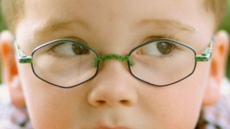Did you know more than 80% of a child’s learning is based on vision? Seeing is our dominant sense and our primary source for gathering information in learning. Vision is a complex process that involves over 20 visual abilities and more than 65% of all the pathways to the brain! One in five children has an undiagnosed vision disorder that is serious enough to impede learning, causing academic and/or behaviour problems. They may become withdrawn or disruptive, sometimes mistakenly labeled learning-disabled.
One out of six children diagnosed with a learning disability actually has a correctable vision problem! But most kids won’t tell you they have a problem because they think everyone sees the same way they do. Not knowing any differently, many of these children simply accept poor vision and other vision problems as normal. Just because your child passes a school vision screening, does not mean he or she does not have a vision problem. The visual skills needed for successful reading and learning are much more complex and involve much more than just 20/20.
Early and regular comprehensive eye and vision examinations with an optometrist are keys to preventing learning disabilities or significant visual impairment in children. They ensure healthy eyes and adequate visual skills essential for successful academic achievement. Optometrists not only diagnose and treat disorders such as amblyopia and strabismus, they can also detect learning related vision problems.
Through Optometric Vision Therapy, we can also manage this condition in conjunction with conventional educational programming. In addition, the cost of providing appropriate treatment for longstanding eye and vision disorders may be significantly higher than the cost of detecting and treating these problems early in life.
So what is Vision Therapy? It is a progressive program of vision procedures performed under doctor supervision, individualized to fit the visual needs of each child. Depending on the case, the procedures are designed to help children develop or improve fundamental visual skills and abilities, improve visual comfort, ease and efficiency, as well as to change how a patient processes or interprets visual information.
With the use of therapeutic lenses/prisms, filters, patches, and many other types of specialized equipment, the goal of therapy in the management of learning related vision problems is to prepare them to take full advantage of the opportunities for learning. The expectation for intervention is to reduce or eliminate the signs and symptoms associated with the child’s particular visual deficit. It is specific and problem oriented, targeting visual efficiency as well as visual information processing dysfunctions.
If your child is struggling in school or he/she has not received a comprehensive vision examination from an Optometrist this year, don’t wait! Early intervention is the key to successful academic achievement. We at Omni Eye & Vision understand the visual needs of children from birth and onward and can provide the expertise and management to ensure that your child does not lag behind, enabling him/her to reach their maximum potential in life. To learn more about your child’s visual needs and what you can do to help, visit www.covd.org and view Patients & Parents section.
By Dr. Melody Tong, Omni Eye & Vision






